
New Visions: Intro to Enlightenment
- Subject:
- History
- World History
- Material Type:
- Primary Source
- Provider:
- New Visions for Public Schools
- Date Added:
- 08/29/2018

New Visions: Intro to Enlightenment

How should we understand Ayn Rand’s political philosophy? In this video, Professor Jennifer Burns of the University of Virginia argues that Rand belongs to the classical liberal tradition.

Conversations with History host Harry Kreisler welcomes Professor Fawaz A. Gerges for a discussion on the origins, evolution and future direction of Islamic militancy. (56 minutes)
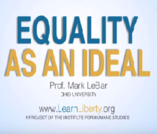
Philosophers across many different ideologies argue that equality is an important human ideal. But what type of equality should we strive for? In this lecture, Professor Mark LeBar of Florida State University reviews four different kinds of equality and the obstacles in achieving them.
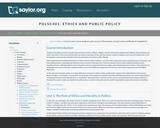
This course will provide the student with an overview of the role that ethical, cultural, religious, and moral principles play in public policy. The course will introduce the student to common themes found in the foundational theories of ethics and morality in politics such as justice, equality, fairness, individual liberty, free enterprise, charity, fundamental human rights, and minimizing harm to others. These themes are integrated into various decision-making models that you will learn about. Students will examine five types of decision frameworks used to make and implement public policy, as well as rationales used to justify inequitable impact and outcomes of policies. Upon successful completion of this course, students will be able to: explain how personal morality and ethics impact the policymaking process; discuss various ethical frameworks used to resolve policy dilemmas; identify statutes, ethical codes, and legal opinions that define the normative parameters of key domestic and international policy issues; assess the impact that public interest groups have on policymaking and execution of policies. (Political Science 401)
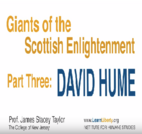
Professor James Stacey Taylor of the College of New Jersey discusses the contributions of philosopher, historian, and economist David Hume to the Scottish Enlightenment, with a particular focus on sentimentalist philosophy.
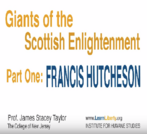
Professor James Stacey Taylor of the College of New Jersey discusses the contributions of philosopher Francis Hutcheson to the Scottish Enlightenment, especially his contributions to the sentimentalist approach to morality.
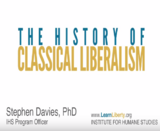
Today people often believe that classical liberalism is all about free market economics, but according to Dr. Stephen Davies of the Institute of Economic Affairs, this definition misses the mark. In this lecture, Dr. Davies explains three key insights from classical liberalism and how the ideology has influenced how we approach subjects like history, economics, and even psychology.
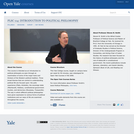
This course is intended as an introduction to political philosophy as seen through an examination of some of the major texts and thinkers of the Western political tradition. Three broad themes that are central to understanding political life are focused upon: the polis experience (Plato, Aristotle), the sovereign state (Machiavelli, Hobbes), constitutional government (Locke), and democracy (Rousseau, Tocqueville). The way in which different political philosophies have given expression to various forms of political institutions and our ways of life are examined throughout the course.
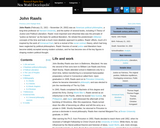
John Rawls (February 21, 1921 – November 24, 2002) was an American political philosopher, a long-time professor at Harvard University, and the author of several books, including A Theory of Justice and Political Liberalism. Rawls' most important and influential idea was the principle of "justice as fairness" as the basis for political liberalism. He refuted the predominant Utilitarian concepts of the time and took a much more idealistic approach to politics. Rawls' efforts, much of it inspired by the work of Immanuel Kant, led to a revival of the social contract theory, which had long been neglected by political philosophers. Rawls' theories of social justice and liberalism have become widely accepted among modern scholars, and he has become one of the key figures in shaping modern political thought.
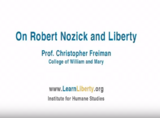
Robert Nozick was one of the most influential philosophers of the twentieth century, but according to Professor Chris Freiman of the College of William and Mary, he is frequently misunderstood. In this lecture, Professor Freiman gives an overview of Nozick’s political philosophy.
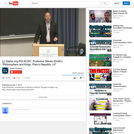
Lecture about Books I and II of Plato's Republic.
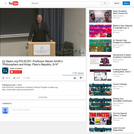
Lecture on Plato's Republic, Books III-IV.

In terms of a political entity, a state is any politically organized community living under a single system
of government. States may or may not be sovereign. For instance, federated states are members of a
federal union, and may have only partial sovereignty, but are, nonetheless, states. Some states are
subject to external sovereignty or hegemony, in which ultimate sovereignty lies in another state. States
that are sovereign are known as sovereign states.

Plato's Republic, presented as a dialogue with Socrates.

Review of Political Philosophy Reader : An Open Educational Resource: https://drive.google.com/open?id=1DERWm3kL46bnuDE3Ed-DpzoyUbr7gxIsMyFRvKoE1aI

This thought experiment, based on an essay by Professor Thomas Nagel, Philosopher at New York University, encourages students to question the morality of intervention. Professor Nagel attempted to liberate a spider he found living in a urinal from it is seemingly terrible living situation, only to find it dead the next day. Wracked with guilt, he began to question his decision. Should he have moved the spider? What would you have done?

"Thinkin' 'bout 'Thinkin'" is a three part lesson plan for a high school Social Studies class. Phase 1 is a biographical research paper on a philosopher (political philosopher); Phase 2 is a research paper on a current event; and Phase 3 is a script of a dialogue between two or more political philosophers about two or more current events.